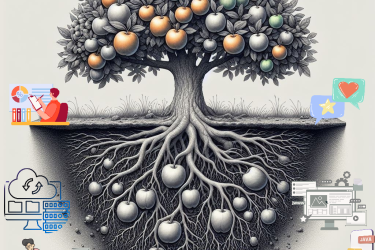Program Management is totally different than project management. You need to be transformer.. It’s not an easy task, really! Here is the reason why it is.

10 things smart program managers do
Do you sometimes wonder how super-achievers outperform others? And perhaps why it is that these rare human beings are always ‘on their game’ and exceed expectations?
“Change your thoughts and you change your world” – Norman Vincent Peale
For 20+ years I have been observing senior leaders who run enterprise-wide technology-driven-change programs and noticed 10 remarkable things they do. It is important to know that over the years they have made a habit of doing these things. For them it has become an automaticity. Here is what these smart program managers do:
1. Understand the business context. As one of the first things, smart program managers do an exhaustive read about the company and the industry it is operating in, with a focus on the corporate strategy, product and service portfolio, key markets and customers. The first weeks into a new engagement they seek to understand more than anything else. They engage with people to get a good sense of what’s really going on and go deep on aspects that may have a high impact on the success rate of the program. Even the most industry experienced program managers go through this step as they believe that good preparation is half the work and rules out any coincidence.
2. Nail down the scope of work. Smart program managers are keen on managing a realistic scope. They work closely with the parties involved and ‘squeeze out’ the ambiguity in the scope definition that ends up in contractual documents, project plans and schedules. With the understanding of the business context, they know how to prioritize the scope of work. That is not only important for planning and scheduling, but also for building a strong team that has the right skill mix. Of course they want to have a strong team across the board, but especially for those scope items that are business critical. Throughout the project life-cycle they relate almost everything that happens back to the scope. What is the impact? Can we still make it happen or do we need to adjust to stay the course?
3. Create awareness. Strong and consistent team performance is based on awareness, potential, motivation and focus. Smart program managers ‘build in’ a level of consciousness in the team such that each member is knowledgeable of what is happening, why it is happening and what the impact is to the project and business. The cause and effect mechanism is one of instruments they use in a team or individual meeting to create awareness. They may for example walk a team through a particular delivery step in its finest detail (e.g. testing) and point them to aspects that can influence the outcome. With that, the team is made aware of what they have to look at during execution, and more importantly how they can self-correct.
4. Visualize the future state. Pointing the team in the right direction by providing clarity of what the future state looks like is crucial. Smart program managers know this and therefore spend a lot of time on opportunity definition, envisioning, and setting goals and objectives. They have a continuity of vision embedded in the approach and with that they ensure that the future state becomes more and more clear as the team goes from business requirements to design to build and ultimately deployment. Oftentimes they lean towards using a lot of visuals to clarify where the team is headed. They are keen on tightly knitting the building blocks of the future state to the scope of work to make sure that what’s being delivered brings the imaginary thoughts to life.
5. Commit and align key stakeholders. Immediately from the start, smart program managers begin to maintain relationships with key stakeholders that can significantly influence program success. The intention is to make the relationship a two-way-street where information about the program flows to the business and the other way around. With the understanding of the business context, the scope of work and future end state, the program manager helps to build the commitment and alignment by connecting the corporate strategy and business needs to the outcome of the program. They also make sure that the right stakeholders are identified and keep a close eye on stakeholders who have a minimum interest in the program, but ask for maximum attention.
6. Drive change. With their helicopter view, smart program managers have a good sense of what is going on where and when. With that skill they play a key role in business transformation by articulating what the program delivers, what the organizational and people impact is, and how that can be best addressed. They continuously keep reminding the team and key stakeholders of why they are going through this journey of change. They are strong motivators and one of the things they do is making things real by relating the outcome to what a day in the future looks like for an individual or group with a similar background.
7. Keep it simple. Smart program managers embrace simplicity and apply that to everything they do. They realize that the business context can be quite volatile, uncertain, complex and ambiguous, and that adding more value to these factors make things worse and can derail the program. It comes down to keeping project management processes, procedures and the application of methods and tools practical by only implementing and using those aspects that make common sense and add value.
8. Make things happen. The drive to think, change and achieve is immense and is the sole reason why smart program managers love to do what they do. Once things start to add up and the confidence grows that the program can actually be delivered, they put their teeth in it and take it to the next level. They are putting the pieces together and shape a plan to get to the future state. At the same time or shortly after they create alternative plans in case a course correction is needed. If they have doubts about the program when it is initiated, they will put a reality stamp on it by pointing to the areas where it falls short and giving recommendations how it can be resolved.
9. Care about people. It is not technology, not process, but people who ultimately drive the success of the program. Smart program managers realize that and make care of people their number one priority. They set their team up for success by arranging relevant learning events, managing expectations and clarifying what the program is about, where the pain-points are and how they can be addressed. Oftentimes they take on a coaching role and help top talent identify, unlock and extend their potential in a way that benefits the person and the program.
10. Sense and respond. Smart program managers are focused on the target and they have a good sense when certain events start to derail the program. Their intention is to prevent that from happening and therefore they have corrective actions readily available for execution whenever it is needed. They have their eyes on the ball all the time and know where it needs to go before it is handed to them. Relevant information is coming to them from many different sources, not solely from status reports but from people who they have build a strong relationship with from the start of the program.
All these 10 things are not just action items that can be checked off a list. They have all become an integral part of the day-to-day behavior of the smart program manager and are instantly executed when its needed. Only the smart program manager knows when.
Reference: https://www.cio.com/article/2951098/leadership-management/10-things-smart-program-managers-do.html



